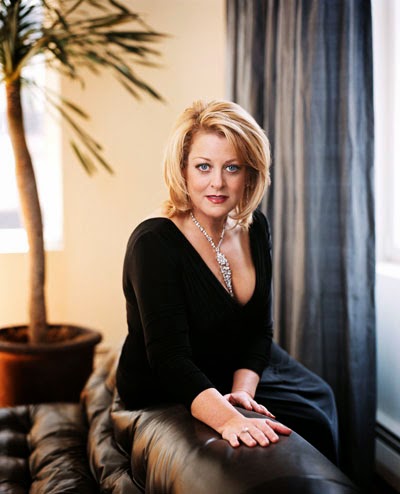Deborah Voigt shows off her post-Isolde side at the Palladium
 |
| Deborah Voigt has weathered personal crises on the way to reconfiguring her career. |
The recital tour that brought her to the Center for the Performing Arts Saturday night demonstrated that singing in her native tongue is something she'd like to exploit more. And the 53-year-old soprano seems poised to emphasize music that requires less stamina than, for instance, the main female role in Wagner's "Tristan und Isolde," a Washington National Opera production of which she withdrew from last month.
What several hundred people heard at the Palladium was a program focusing on art song in the first half, beginning significantly with a pioneering female American composer, and after intermission mussing the conventionally prim recital coiffure with a serio-comic mix of works by three 20th-century American men. Her generally lighthearted remarks from the stage, though too offhandedly directed at only the first ten rows, extended an unmistakable invitation to relax.
Admittedly, I remained largely impervious to Voigt's brand of forceful charm, but I found her vocal command and interpretive breadth largely convincing. The way the voice blossomed as it ascended into the upper register was thrilling, her diction was conscientious in well-projected Russian, German and English, and her carriage and facial expressions always suited what she was singing.
She used her hands and arms naturally, despite a tendency to "mickey-mouse" gesturally certain words: She wiggled the fingers of both hands downward as she sang about stormy precipitation in Richard Strauss' "Schlechtes Wetter," and in Benjamin Moore's setting of Robert Herrick's "To the Virgins, to Make Much of Time," she shook a warning forefinger at "Then be not coy" and held up her ring finger at the poet's advice to "go marry."
Vocally, a tendency to "close" the voice in midrange, producing a nasal tone quality, showed up in a few places — the first Amy Beach song on the program and in "Schlechtes Wetter." Normally there was clarity in all registers, and in the refrain of Tchaikovsky's "Was I not a little blade of grass in the field," she displayed glowing low notes. That song — along with Strauss' "Ah, Lieb, ich muss nun scheiden"—was a highlight of the first half, particularly moving in its final measures.
By intermission, Voigt's bond with the audience was made solid by a prearranged choral underpinning (from Butler and Indiana University voice students in the first couple of rows) of the last line in each stanza of Strauss' "Zueignung."
Pianist Brian Zeger provided effective support throughout. His Tchaikovsky accompaniments were flavorful and impassioned. The comic turn of "Schlechtes Wetter" in the last stanza was capped by a witty coda. His brilliant work in the distinctive urban-chic songs of Leonard Bernstein and William Bolcom helped Voigt become assertive and theatrical with the sort of music she is increasingly turning to.
In her encores, she reached back to the Great American Songbook to put a seal on the idiom she feels increasingly most comfortable in: the rollicking "I Love a Piano" (including a final chorus when she joined Zeger on the bench for a four-hands conclusion) and "Can't Help Lovin' That Man" from "Show Boat."



Comments
Post a Comment